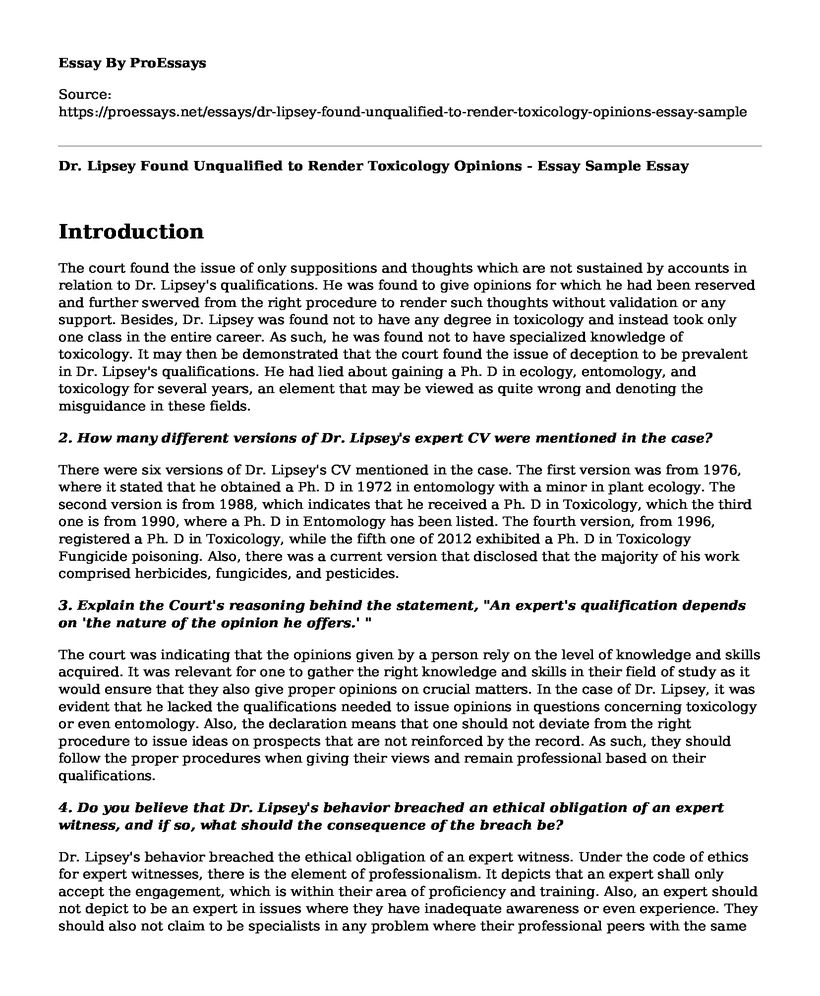Introduction
The court found the issue of only suppositions and thoughts which are not sustained by accounts in relation to Dr. Lipsey's qualifications. He was found to give opinions for which he had been reserved and further swerved from the right procedure to render such thoughts without validation or any support. Besides, Dr. Lipsey was found not to have any degree in toxicology and instead took only one class in the entire career. As such, he was found not to have specialized knowledge of toxicology. It may then be demonstrated that the court found the issue of deception to be prevalent in Dr. Lipsey's qualifications. He had lied about gaining a Ph. D in ecology, entomology, and toxicology for several years, an element that may be viewed as quite wrong and denoting the misguidance in these fields.
2. How many different versions of Dr. Lipsey's expert CV were mentioned in the case?
There were six versions of Dr. Lipsey's CV mentioned in the case. The first version was from 1976, where it stated that he obtained a Ph. D in 1972 in entomology with a minor in plant ecology. The second version is from 1988, which indicates that he received a Ph. D in Toxicology, which the third one is from 1990, where a Ph. D in Entomology has been listed. The fourth version, from 1996, registered a Ph. D in Toxicology, while the fifth one of 2012 exhibited a Ph. D in Toxicology Fungicide poisoning. Also, there was a current version that disclosed that the majority of his work comprised herbicides, fungicides, and pesticides.
3. Explain the Court's reasoning behind the statement, "An expert's qualification depends on 'the nature of the opinion he offers.' "
The court was indicating that the opinions given by a person rely on the level of knowledge and skills acquired. It was relevant for one to gather the right knowledge and skills in their field of study as it would ensure that they also give proper opinions on crucial matters. In the case of Dr. Lipsey, it was evident that he lacked the qualifications needed to issue opinions in questions concerning toxicology or even entomology. Also, the declaration means that one should not deviate from the right procedure to issue ideas on prospects that are not reinforced by the record. As such, they should follow the proper procedures when giving their views and remain professional based on their qualifications.
4. Do you believe that Dr. Lipsey's behavior breached an ethical obligation of an expert witness, and if so, what should the consequence of the breach be?
Dr. Lipsey's behavior breached the ethical obligation of an expert witness. Under the code of ethics for expert witnesses, there is the element of professionalism. It depicts that an expert shall only accept the engagement, which is within their area of proficiency and training. Also, an expert should not depict to be an expert in issues where they have inadequate awareness or even experience. They should also not claim to be specialists in any problem where their professional peers with the same level of awareness and capability would not stand out as professionals (Paul & Narang, 2017).
Dr. Lipsey was found by the court to have utilized an approach that fails to gratify the correct standard. The method he proposed was not proper, and instead, there was another appropriate one endorsed by the World Health Organization, agencies of the government of the United States, and the National Academy of Sciences. Also, his discovery deposition revealed that he did not have a degree in toxicology. It further showed that he did not have specialized knowledge of toxicology. Dr. Lipsey lied about his obtained a Ph. D in all the six versions of his CV presented. As such, this is also a breach of the ethical obligation of an expert witness as he was dishonest concerning his qualifications. An expert witness is required to be open and honest about his qualifications and thus give information in an area where he has the right and adequate knowledge as well.
References
Paul, S. R., & Narang, S. K. (2017). Expert witness participation in civil and criminal proceedings. Pediatrics, 139(3), e20163862.
Cite this page
Dr. Lipsey Found Unqualified to Render Toxicology Opinions - Essay Sample. (2023, Apr 04). Retrieved from https://proessays.net/essays/dr-lipsey-found-unqualified-to-render-toxicology-opinions-essay-sample
If you are the original author of this essay and no longer wish to have it published on the ProEssays website, please click below to request its removal:
- A Discussion on Legalize and Possession of Marijuana Essay
- Paper Example on Human Rights and Research in Healthcare
- Essay Sample on Sicilian Mafia
- Essay on Leadership in Criminal Justice: Attracting Subordinates and Improving Performance
- Essay Sample on Hate Crimes: Prejudice, Targets & Bias Incidents
- Research Paper on Restorative Justice: An Alternative to Retributive Justice
- Research Paper on Juvenile Criminal Justice System: Rehabilitation Through Different Processes







